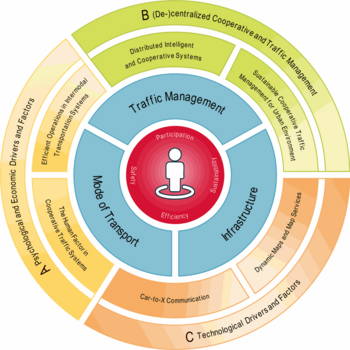
Research Profile
The primary challenges developing future urban traffic systems are the issues of traffic safety and urban and environmental compatibility. Cooperation among traffic participants and among them and their environment are important elements in overcoming these challenges. To develop a cooperative approach for assisting traffic participants, it is important to understand the dynamic interactions between traffic participants and the infrastructure. With this psychological and technical insight, models can be created. Based on these, strategies and methods for cooperative traffic management can be designed.
To find the implied correlation, the individual traffic participant is being put in the center of the observation (image 1). He moves in a traffic system, which is characterized by the existing infrastructure, the existing means of transportation and influenced by regulations of the cooperative traffic management. He is supported by technical systems. Nowadays, advanced driver assistance systems are informing and warning, but in the future they will change to cooperative advanced assistance systems, considering in the individuals’ decisions and factoring them in the dynamic traffic management.

The researchers investigate the interactions of central (system-optimal) regulations and distributed (user-optimal) actions as well as the creation of dynamic models with both sides being factored in. The Research Training Group intends to take up complex questions of the distributed cooperative traffic management and intends to ensure the disciplinary and interdisciplinary qualification of PhD candidates.
Under the aspect of comfort and safety, Car-to-Car Communication/-Information, cooperation and advanced driver assistance are part of many ongoing and completed projects. The point of efficiency of linked cooperative systems has only been covered in first research approaches. The approaches especially involve the space and time of traffic in its complexity connected to standards of a central traffic management and the integration of models made by local participants. The perception and evaluation of the participants, e.g. their reactions to adequate suggestions and arrangements have hardly been considered. Also questions about dynamic data storage are missing attention in research of cooperative traffic systems.
The integration of distributed decisions made by users and local systems, which is important for functioning in society as a whole, into the urban traffic planning is, therefore, the central innovation of the research training group SocialCars. Hence, it has a higher level than others in areas of traffic management.